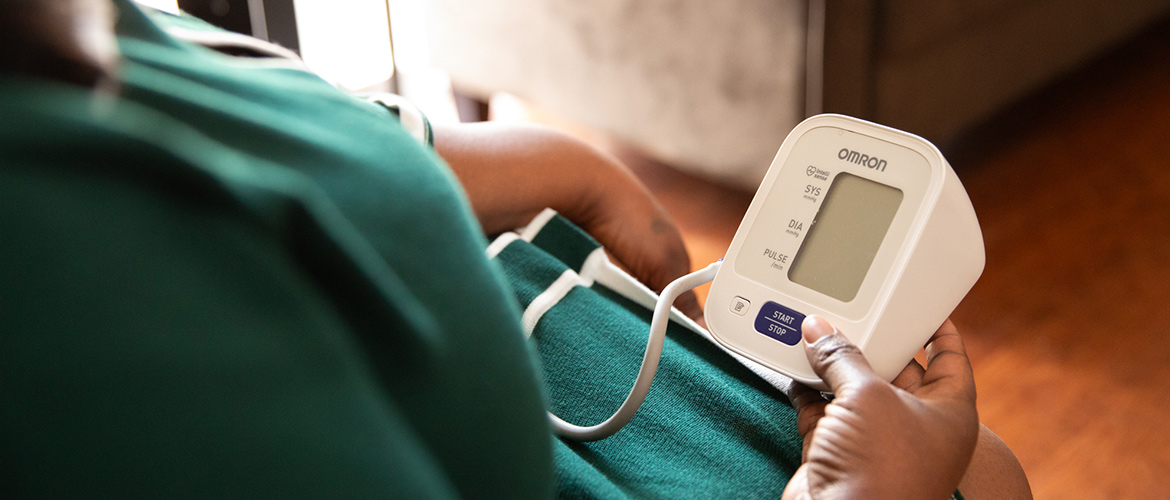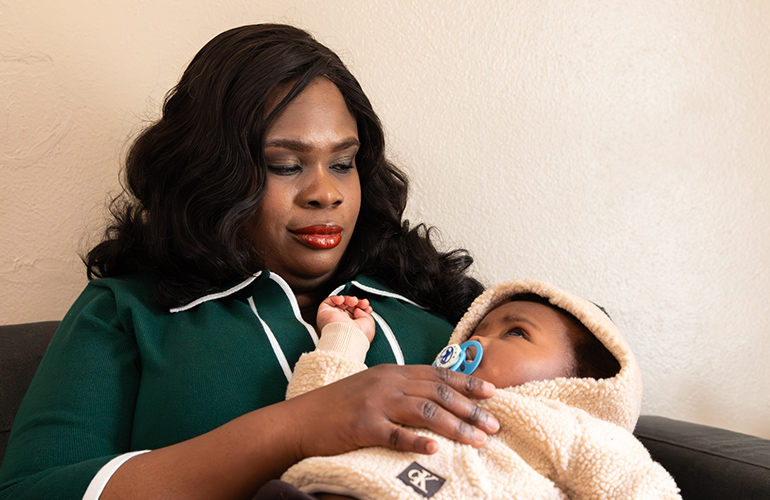An ultrasound during Chinenye’s second trimester revealed her baby Xavier wasn’t growing as expected. The complication — coupled with her history of hypertension — she was told, could force an early delivery.
Chinenye was referred to the hospital’s maternal fetal medicine specialist to better monitor the condition and manage her blood pressure. After weekly visits to the doctor and lifestyle changes, Xavier’s condition gradually improved and Chinenye gave birth at 37 weeks.
“This pregnancy was a little rough for a few months, but my first pregnancy was even harder,” says Chinenye , a single mother who struggled with preeclampsia, depression and panic attacks before giving birth to her first son Adrian.
What made this pregnancy different? Chinenye says it started during a standard prenatal visit to a Healing Hands Ministry Health clinic in Dallas, where she enrolled in a new program to track her blood pressure, request no-cost rides to doctor’s appointments, order prescription medications and connect with behavioral health care specialists.
‘One-stop-shop for moms’
The program was a smartphone app that automatically notified Chinenye’s provider of elevated blood pressure, enabling quick intervention. A medical kit with remote monitoring tools including a blood pressure cuff and, if necessary, a blood glucose monitor shipped directly to her door allowed Chinenye to track her blood pressure.
Blue Cross and Blue Shield of Texas' expanded Special Beginnings® maternal and infant health initiative collaborated with two technology companies to help community-based organizations adopt tech solutions for their clients. The effort started in Texas in 2023 and served nearly 50,000 Texans in its first year.
Patients use the apps to schedule in-person doctor’s appointments, conduct telemedicine visits, access online prescription delivery and track health goals, among other services. Another feature allows peer support for mothers.
Through improved access to preventive care and data-driven solutions, the apps focus on outcomes for women in underserved areas, who suffer worse pregnancy outcomes.
Data from the Centers for Disease Control and Prevention show that more than 80% of pregnancy-related deaths are preventable. That includes improving access to quality care, including behavioral health, and reducing social and economic factors that contribute to poor outcomes.
“These tech apps have been game changers for adding capacity and providing resources to address non-medical needs and connection to care to providers such as doulas, nutritionists, and telehealth to entities that otherwise would not have this access,” says Dr. Yolanda Lawson, executive medical director for maternal and infant health.
So far, their efforts are paying off.
“We’re starting to close gaps in access — especially for patients with poor economic backgrounds and health literacy,” says Dr. Taibat Eribo, medical director of women’s services at HHM Health. “Working at a federally qualified health center, we’re committed to caring for patients at the margins of access, and having an app to help close care gaps is amazing.”
‘Like family’
The resources provided to Chinenye before and after Xavier was born made her second pregnancy completely different from her first, she says. She’s now living in Dallas with her two healthy sons.
“The app gave me peace of mind to know that providers could see my blood pressure and other numbers,” she says. “They were like family, always asking if there was anything I needed.”


